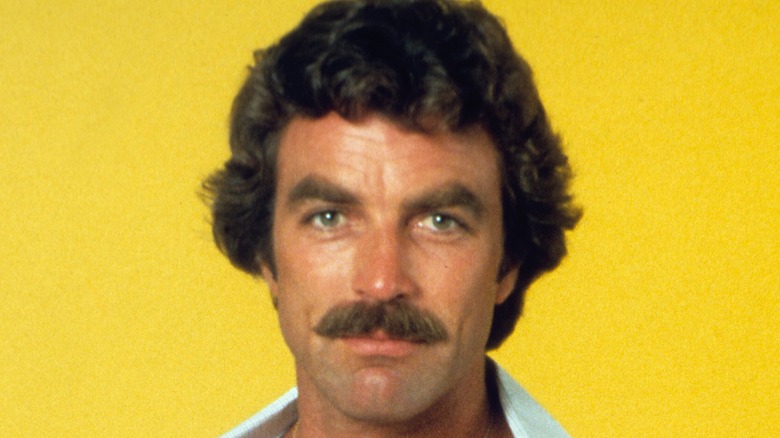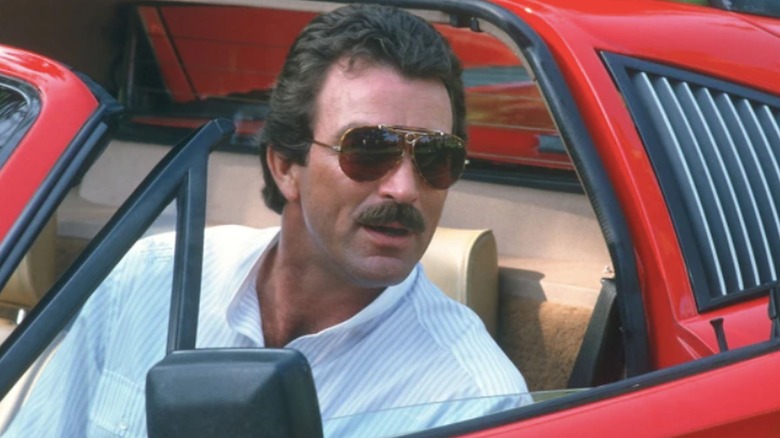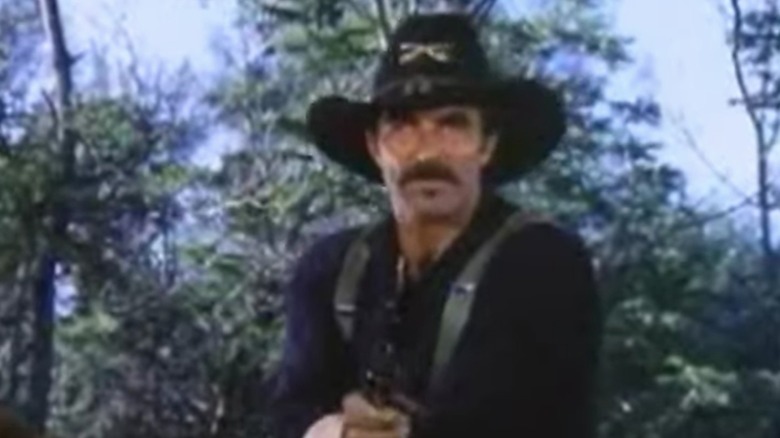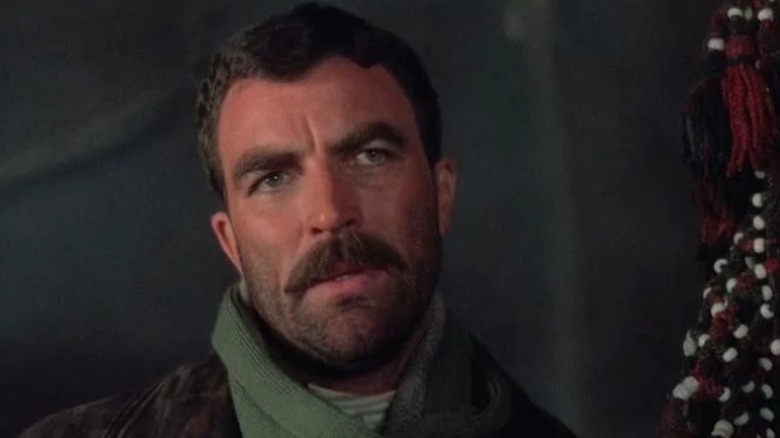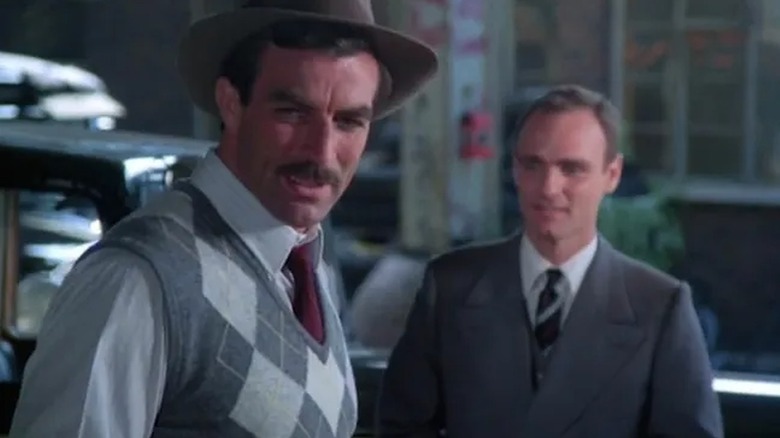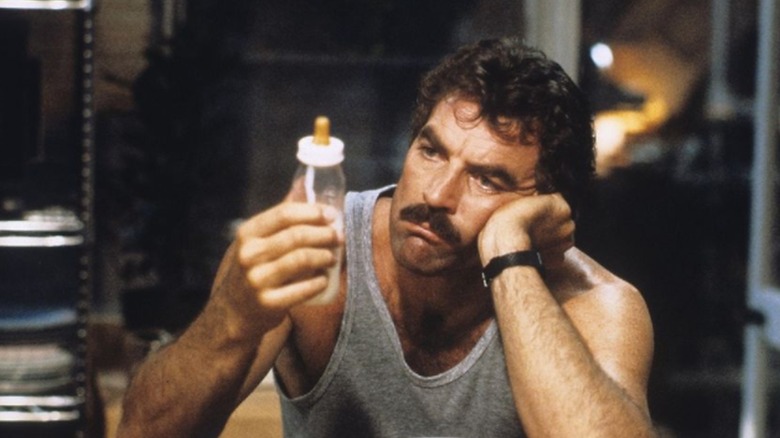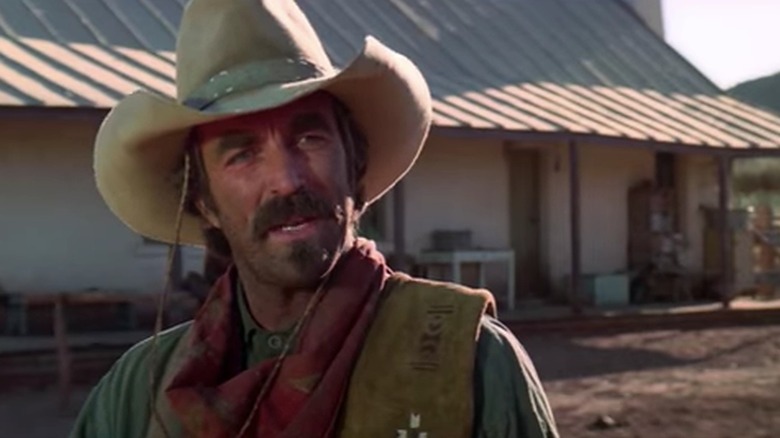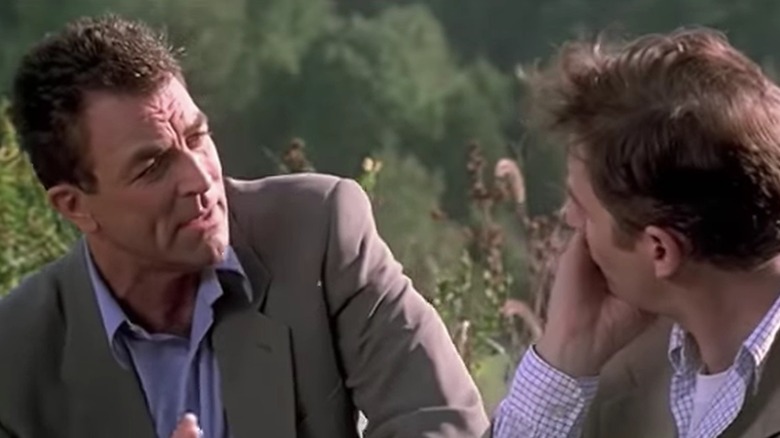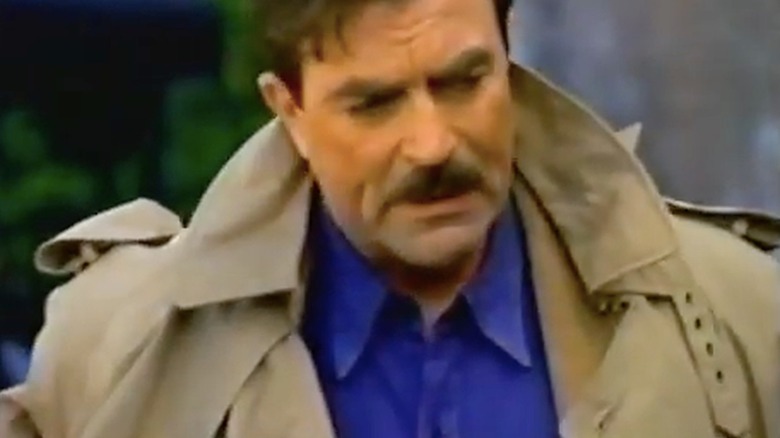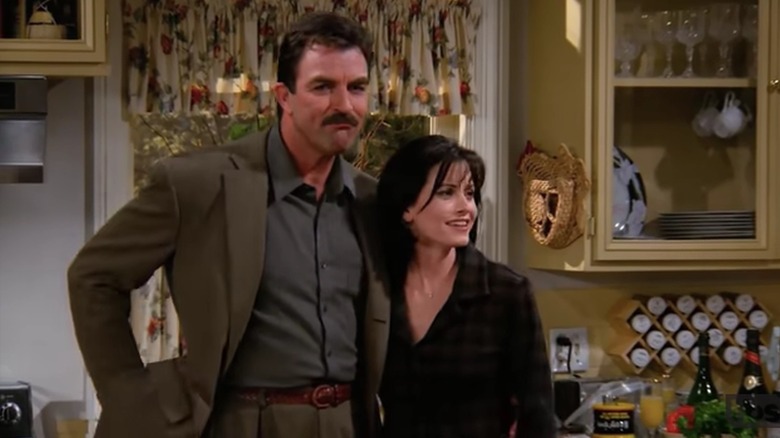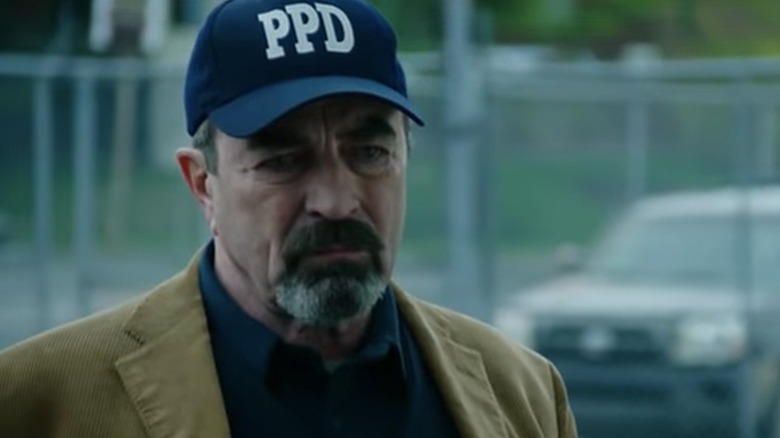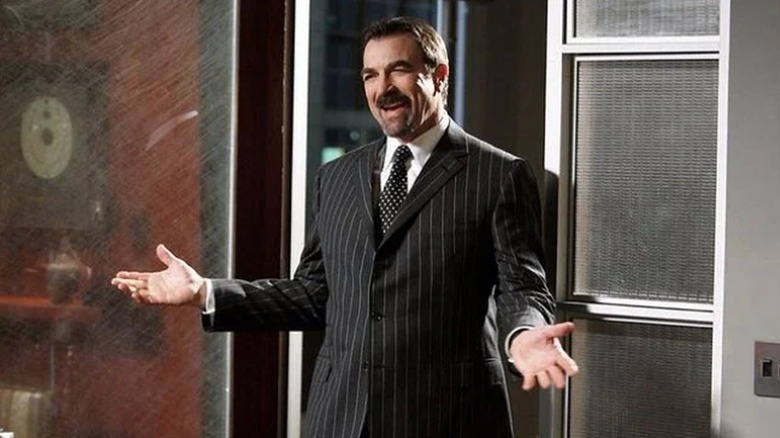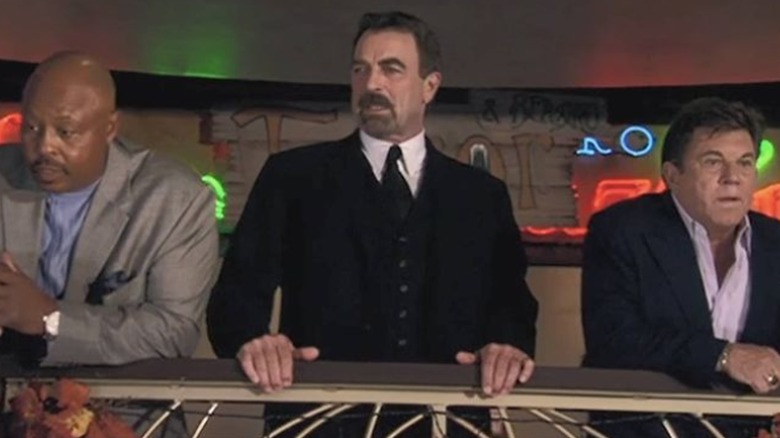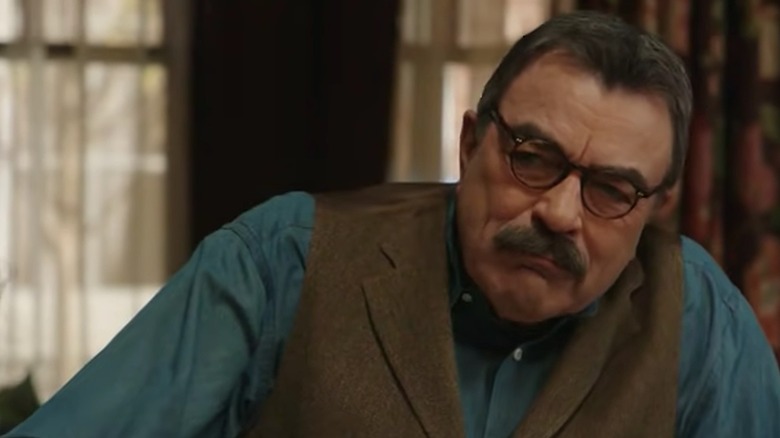Tom Selleck's Best Movie And TV Roles
Tom Selleck was a basketball-playing business administration major at the University of Southern California in the mid-'60s, when a drama coach spotted him and suggested he try acting; soon after, he dropped out and began studying acting under Actors Studio-trained stage and film director/producer/instructor Milton Katselas.
Around the time he began serving in the National Guard to satisfy his Vietnam draft notice, Selleck began appearing on game shows ("The Dating Game") and commercials (for Pepsi, among others), landing small parts on numerous television shows in the '70s before earning his breakout role in 1980 as Thomas Magnum on "Magnum P.I."
This series won 10 Emmys, making Selleck (and his mustache) a huge TV star and sex symbol in the 1980s. During the series' eight-year run, Selleck did guest appearances as Magnum on other shows as well, including "Murder She Wrote" and "Simon and Simon." The red-hot star may have missed out on being Indiana Jones, but he did help inspire "Chip 'n Dale Rescue Rangers," and Magnum opened many doors, leading to a substantial film career and roles as everything from a jewel thief to a private detective, a police officer to a cowboy, an ophthalmologist, and even a journalist. Still going strong all these decades later with the ratings juggernaut "Blue Bloods," let's take a look back on the remarkable career of Tom Selleck.
Magnum P.I. (1980—1988)
In 1980, Tom Selleck was cast as Thomas Magnum, a Vietnam veteran who went to work as a private detective in Hawaii after leaving the Navy. Over 158 episodes, the CBS series "Magnum P.I" cast Selleck as a normal, Detroit Tigers cap-wearing guy living through extraordinary circumstances.
Living rent-free in a guest cottage on the Hawaiian estate of mystery author Robin Masters (who audiences never met) in return for providing occasional security checks for the estate, Magnum had access to Master's red Ferrari as a perk for providing security. Higgins (played by John Hillerman) would thwart Magnum's fun at every turn — and there was always an underlying suspicion amongst the audience that Higgins might actually be Masters, adding an element of mystery to the arrangement.
"Magnum P.I." was a huge, sanitized, made-for-TV male fantasy, '80s style. Magnum lived a glamorous life in paradise, with his friends (and fellow Vietnam veterans) T.C. and Rick helping him with investigations. It made Selleck a huge star, setting the tone for other popular series of this era including "The A-Team" and "Knight Rider."
The series was also a progenitor in playing with narrative devices. "Magnum P.I." had Selleck sometimes breaking the fourth wall, looking directly at the camera before smiling, letting the audience in on an inside joke. Decades later, the device would be frequently employed in everything from "Deadpool" and "House of Cards" to "Saved By the Bell" and "Fleabag."
The Shadow Riders (1982)
In 1982, Selleck starred as Mac Traven opposite Sam Elliot in the CBS made-for-TV movie "The Shadow Riders," a Western adapted from a Louis L'Amour novel that reunited the stars of 1979's L'Amour-based "The Sacketts." The TV movie told the story of two brothers from Texas who fought on opposing sides of the war; Mac (Selleck) fought for the Union, and Del (Elliot) fought for the Confederates. Upon their return home, the brothers discovered their younger brother Jesse (played by Jeff Osterhage) and his fiancee had been taken hostage by renegade Confederate soldiers refusing to recognize the results of the war — and had to team up with other members of the family to bring them home safely.
Over the years, Selleck has appeared in a myriad of Westerns, a genre that suits both him and his facial hair — characteristics he shares with longtime friend Elliot. The two men were both in a Fox "new talent" program together, and first appeared alongside each other onscreen in a 1969 episode of the series "Lancer," both men without their signature mustaches and with Selleck earning his first onscreen credit. "Sam and I were already good friends," he recalled in 2021 of those early times supporting each other. "Sam was more formed in those [early] days, [knowing] exactly what he wanted. I was still learning the craft."
High Road to China (1983)
In 1983, Selleck starred opposite Bess Armstrong in his first lead role in a feature film, playing Patrick O'Malley in Warner Brothers' "High Road to China."
A period film set in the 1920s, "China" focused on Eve Tozer (Armstrong), a spoiled American heiress living it up in post war Istanbul but in need of a pilot to help find her missing father before he is declared dead, causing her to lose a substantial inheritance. Eve and Selleck's O'Malley were an endearing mix of cantankerous pilot and head-strong heiress, and the flick (which had a solid supporting cast that included Wilford Brimley, Brian Blessed and Jack Weston), has an audience score on RottenTomatoes hovering around the mid-sixties.
While the film didn't get rave reviews from critics like Roger Ebert (who dismissed it as "a pale echo of 'Raiders'"), it did decently enough in the box-office, thanks largely to Selleck's star power.
Lassiter (1984)
1984's "Lassiter" brought Selleck back to the big screen, this time as an American jewel thief living in London in the late 1930s. After getting arrested, Nick agrees to steal millions of dollars' worth of Nazi jewels from the German Embassy in London, before they are shipped to South America to help fund Hitler's army.
The stylish heist film cast opposite Jane Seymour, and although intended to keep Selleck's "Magnum" momentum going, it failed to make much of an impact at the box-office Nevertheless, Ebert enjoyed this Selleck outing: "The movie is acted and directed with such style that we have fun slogging through the silliness," the legendary critic said. "'Lassiter' is a movie that seems to have been made with Selleck in mind, and he delivers."
Three Men and a Baby (1987)
Tom Selleck came back to the big screen in a major way as manly-man architect Peter in "Three Men and a Baby," co-starring alongside Ted Danson and Steve Guttenberg. The comedy, about three bachelors living in Manhattan and trying to care for a baby left on their doorstep, was a big hit and commercial success at the box-office, raking in over $167 million, making it one of the most successful films of the decade. A remake of the farcical French hit, "Trois Hommes et un Couffin," the film was directed by none other than Leonard Nimoy — and if you think the concept feels ripe for a reboot, well, apparently Zac Efron agrees with you.
Coupled with 1990's "Three Men and Little Lady," the "Three Men" films play more than a bit dated now (fatherhood sure has come a long way), particularly because the three friends' ineptitude is the main source of fodder for the comedy. But the films also had their sweet moments, when we saw lifelong bachelors like Selleck's Peter coming to actually enjoy parenting. It was Selleck's first hit movie, and proof that he could make it on the big screen at a time when few TV actors could.
Quigley Down Under (1990)
This breezy adventure film, about an American sharpshooter who travels to Australia for a job — only to discover it requires killing indigenous Aborigines — was a well-received quasi-Western for Selleck. From "Lonesome Dove" director Simon Wincer, the film attempted to mix the success of that series with the late-'80s Australian boom that brought Americans the "Crocodile Dundee" films, Yahoo Serious and Jacko.
Co-starring Alan Rickman and Laura San Giacomo and featuring an early appearance by Ben Mendolsohn, the film had an inspiring final act with Quigley conspiring with the natives to fight back against the evil intentions of rancher Elliott Marston (Rickman).
"Quigley" wasn't much of a commercial success, but is well-remembered decades later. San Giacomo's performance is a nuanced mix of hilarious and tragic, and the historical accuracy of the genocide of indigenous Aborigines is also a strength. Selleck, meanwhile, brought his abundant charm and humor to the role, and he is clearly enjoying himself this time around.
In & Out (1997)
In the opening scene of "In & Out," teacher Howard Brackett (played by Kevin Klein) and the small town of Greenleaf, Indiana are watching the Academy Awards to see local boy-turned-movie star Cameron Drake (Matt Dillon) win an Oscar for his portrayal of a gay soldier. In his acceptance speech, he thanks Mr. Brackett, outing him as gay to the entire world.
The scene — inspired by Tom Hanks' 1994 Oscar acceptance when he named two gay men from his high school — kicks off this fictionalized account of how the moment turns Brackett's life upside-down. Selleck was a key part of the supporting cast as Peter Malloy, an entertainment reporter who comes to town to cover the story involving the closeted Brackett — engaged to marry a fellow teacher played by Joan Cusack — and tells his own coming-out story that inspires Howard to follow suit.
Although it might feel a bit dated today, "In & Out" represented a major step forward for mainstream Hollywood gay portrayals at the time — and Selleck's kiss with Kline was something of a watershed moment. Suddenly, a "gay movie" had opened at number one at the box office.
"I got a lot of questions afterwards: 'I didn't know you'd do a movie like this!'," he recalled in 2015. "Did I consider it a risk? I don't think about image or stuff like that. I just thought it was a great opportunity to be in an ensemble piece with a character who was interesting to me ... he carries the message of the movie to Kevin Kline ... in a very funny way."
The Closer (1998)
Although the CBS mid-season sitcom "The Closer" only ran for a brief 10 episodes, it held a lot of promise; looking back years later, it still feels like a role that could have become the next iconic Tom Selleck character, if it had only been given a bit more rope.
Selleck was cast as Jack McLaren, a smooth-talking advertising executive fired by his agency after Jack's competitive nature loses their biggest client. Starting his own ad agency and taking his creative team with him (headed by a hilariously grumpy Ed Asner), the series depicted Jack as a newly-divorced man in a mid-life crisis freefall.
Depicting the daily activities of life at an advertising agency and punctuated by enough funny moments to show sides of Selleck audiences had rarely seen, "The Closer" was unable to hit its stride. But Selleck, once again, was larger-than-life, this time as a roguish advertising executive.
Friends (1996—2000)
Selleck continued the embracing of his humorous side with a string of guest star appearances on "Friends," one of the biggest hits on television at the time. Playing Dr. Richard Burke, Monica's older boyfriend, the role re-introduced Selleck to a new generation of fans, and the skill with which he held his own alongside the iconic cast earned the veteran star an Emmy nomination for Outstanding Guest Actor in a Comedy Series (for the Season 6 finale "The One with the Proposal").
"I hadn't done a three-camera live show since 'Taxi,'" he told The Today Show in 2020. "It scared me a little. But that's the price you pay for opportunity."
Originally slated to only do three episodes, Selleck's plotline about Monica's budding relationship with her father's friend was a hit with audiences, the actor ended up doing ten of them altogether. "It was a great place to work," Selleck said in 2020. "If the opportunity came up, I'd do it again." The actor made a special guest appearance on HBO's 2021 reunion show.
Jesse Stone TV Movies (2005 — )
Selleck struck gold again in the mid-'00s with Jesse Stone, an alcoholic former police chief forced into early retirement with a partial pension, determined to get his job back and working as a "temporary consultant" to the state police in the meantime.
Based on a popular series of Robert B. Parker detective novels, the 9 "Jesse Stone" TV films (and counting) were originally broadcast on CBS, with 2015's "Jesse Stone: Lost in Paradise" airing on the Hallmark Channel. Around the time of the fifth film, Selleck and collaborator Michael Brandman took over the writing of the films — and in 2017, the actor revealed that a deal is in place for a 10th film he will be writing.
A flawed character with his heart in the right place, the character has clearly resonated with viewers — as has Selleck's portrayal.
"Jesse sometimes does the wrong thing for the right reasons," he said of the character in 2015. "Jesse is damaged." I relate to both guys. The anxiety in this case, since I went right from Jesse Stone back to Blue Bloods, was, "How am I going to switch gears? I don't want any Frank-isms in Jesse, and I don't want any Jesse-isms in Frank."
"Paradise," which had Luke Perry playing a serial killer, was a hit with audiences. In discussing the popularity of the series, Yahoo! said that its key strength was "a taciturn malcontent made charming entirely on the strengths of Selleck's quiet, authoritative, admirably un-showy performances. The actor seems to have a deep affinity to the Stone character, perhaps because Jesse allows Selleck to tap into a melancholy, meditative mood wholly unlike Selleck's best-known TV roles."
Boston Legal (2006)
In 2006, Selleck guest-starred as Ivan Tiggs in four episodes of "Boston Legal," playing the ex-husband of Shirley Schmidt (Candice Bergen). Although already engaged to his next wife, Ivan made no secret of the fact that he'd be willing to dump her if only Shirley would be open to giving their marriage another shot.
The David E. Kelly series took home five Emmys over as many seasons thanks to a terrific cast that included James Spader, William Shatner, John Laroquette, Taraji P. Henson, Monica Potter, Rene Auberjonois and many others at various times, and Selleck held his own as a rich womanizer married five times — going on six.
During Selleck's guest appearances, Ivan repeatedly tried to get Shirley back — providing some wonderful scenes for Selleck and Bergen, two Hollywood legends, to go toe-to-toe with each other. Although Selleck would only appear in four episodes of the series, he made a memorable impact. He also continued his '00's career renaissance with another scene-stealing small role (like in "Friends") that he had elevated to something more.
Las Vegas (2007—2008)
Selleck made waves on this Josh Duhamel/James Caan drama about a casino surveillance team, which ran for five seasons and over 100 episodes. Coming in late to the show, Selleck took over for Caan as the new owner of the Montecito Casino; it was his first regular TV work since "Magnum," but would be short-lived, as the Caan-less "Las Vegas" was on its last legs and even Selleck's presence couldn't breathe enough new life into the series.
Over 19 episodes Selleck played AJ Cooper, a former Marine and cattle rancher who also owned a tech company before the Montecito. Series writers used the opportunity to reimagine the series around a mysterious new owner — including a Season 5 cliffhanger that made it look like Cooper had died in a plane crash, only to show up at his own memorial service unscathed.
Unfortunately, "Las Vegas" was canceled after the season finale aired, making it the end of the series, and leaving fans with no closure.
Blue Bloods (2010—2022)
For more than a dozen years and 200-plus episodes, Tom Selleck has played Frank Regan, the New York City Police Commissioner on "Blue Bloods." Although many will forever remember him as Magnum, "Blue Bloods" has produced more than twice as many episodes with Selleck as its star, making the series arguably his most iconic role.
Oddly enough, at first Selleck was hesitant about taking on the role of the Irish-American patriarch of a law enforcement family whose only predictable moment is its weekly Sunday dinner together. "I worked about 90 hours a week on 'Magnum'," he recalled in 2015. "So I had concerns about what this was going to do to my personal life."
Eventually, Selleck struck a deal with CBS that would allow him to be bi-coastal, spending time with his wife in California on their ranch.
Recently, Selleck was asked if he intended on staying with the show despite the cross-country commute. "I'd never say there is a point where I wouldn't say enough ... I'm always looking out there for what's next," he explained. "I can tell you this: I plan on staying an actor as long as I'm wanted."
